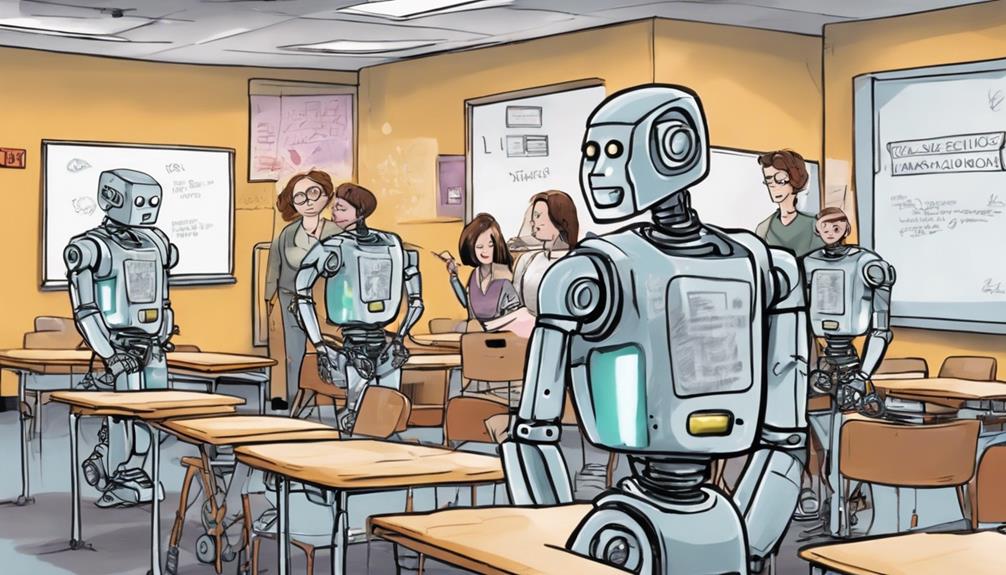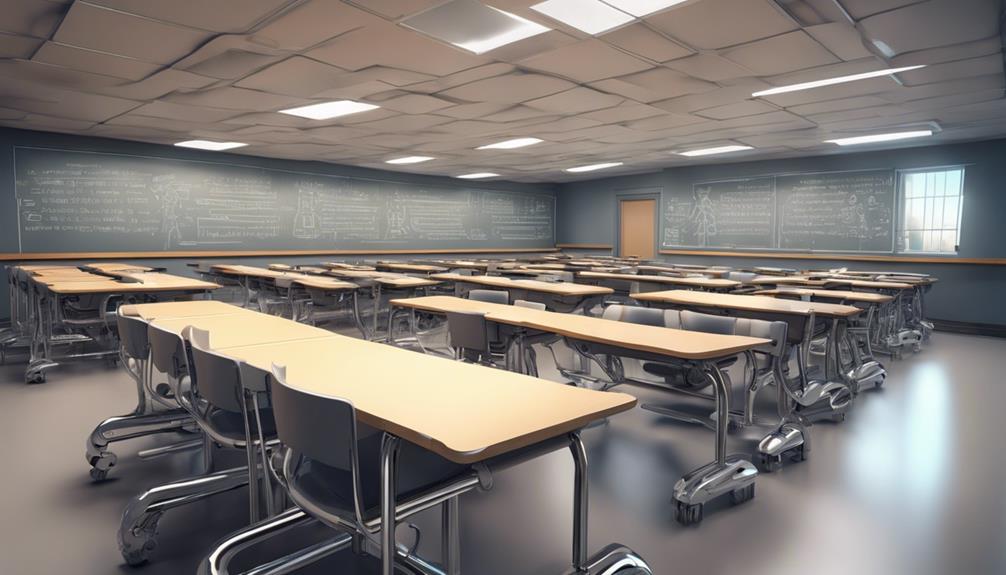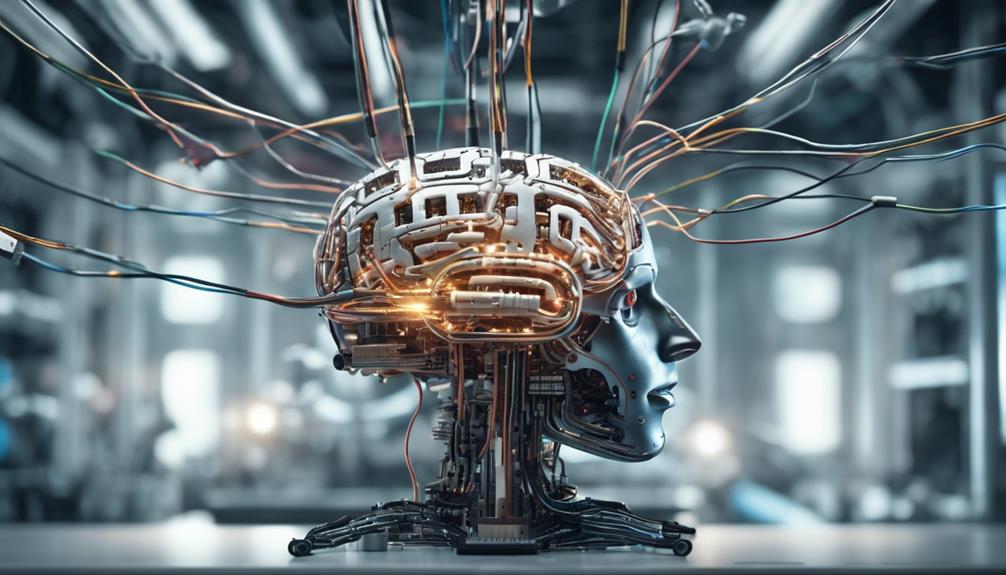As technology continues to integrate into the educational environment, the debate over whether robots should replace teachers is becoming more prominent. This requires a detailed examination of the potential consequences.
The debate encompasses complex considerations ranging from the efficacy of personalized learning to the nuances of emotional intelligence and adaptability that distinguish human educators.
While the benefits of AI in education are compelling, the ethical dimensions and societal impact of a robot-led classroom raise thought-provoking questions.
The evolving landscape of education beckons a closer look at the intersection of human ingenuity and artificial intelligence, sparking a dialogue that navigates the boundaries of innovation and tradition.
Key Takeaways
- Robots offer efficiency and personalized learning, complementing human teachers.
- Challenges include emotional intelligence, nuanced understanding, and holistic development.
- Ethical considerations involve data privacy, bias mitigation, and human connections preservation.
- Future teaching balances personalized support, emotional intelligence, and creativity with technological efficiency.
The Role of Robots in Education
In the realm of education, robots play a pivotal role by revolutionizing traditional teaching methods through their ability to streamline administrative tasks, provide personalized learning experiences, and foster student engagement and critical thinking skills. Robots are not here to replace teachers but rather to complement their roles in the classroom. By taking over mundane tasks like grading, attendance, and basic instruction, robots free up teachers to focus on more interactive and personalized forms of teaching. This collaborative approach between robots and teachers allows for a more efficient use of time and resources.
Moreover, educational robots offer personalized learning experiences tailored to individual student needs and learning styles. Through the use of Artificial Intelligence (AI), robots can analyze student data in real-time, providing valuable insights to teachers on student progress and areas that need improvement. This data-driven approach enhances student engagement, collaboration, and critical thinking skills, creating a dynamic learning environment that caters to the diverse needs of students.
Benefits of Robot Teachers

How do robot teachers revolutionize personalized learning experiences in education? Robot teachers offer a range of benefits that can enhance the educational landscape:
- Personalized Learning: Robot teachers can provide tailored learning experiences that cater to the individual needs and learning styles of each student.
- Consistent Feedback: They offer consistent and unbiased feedback on student work, helping them track their progress and make improvements.
- Efficiency in Grading: Robot teachers can efficiently grade assignments and provide instant feedback, saving time for both students and human teachers.
- Increased Access to Education: By being able to reach remote or underserved areas, robot teachers have the potential to increase access to education for students who may not have had the opportunity otherwise.
- Supplement Human Teachers: Robot teachers can handle repetitive tasks, allowing human teachers to focus on more interactive and creative teaching methods that require emotional intelligence and personalized interaction.
Challenges of Replacing Teachers With Robots
Robot teachers, while offering numerous benefits for personalized learning experiences, face substantial challenges in replacing human teachers due to their limitations in emotional intelligence and nuanced understanding. The challenges and opportunities in the role of AI to assist teachers are evident in the table below:
| Challenges | Opportunities | Human Educators |
|---|---|---|
| Emotional Intelligence | Data-Driven Personalization | Empathy and Connection |
| Nuanced Understanding | Efficiency in Grading | Adaptability |
| Personalized Support | Accessibility of Content | Creativity |
| Dynamic Teaching | Adaptive Learning Paths | Flexibility |
| Holistic Development | Real-time Feedback | Comprehensive Evaluation |
The challenges faced by robot teachers highlight the irreplaceable qualities that human educators bring to the table. While AI can provide support and enhance learning experiences, the intricate nature of education, requiring emotional support, creativity, and adaptability, showcases the indispensable role of human teachers in fostering well-rounded student development.
Ethical Considerations in Education Automation

Within the realm of education automation, the ethical landscape is becoming increasingly intricate and multifaceted, demanding a careful examination of data privacy, bias mitigation, and the preservation of human connections. Ethical considerations in the educational sphere are crucial as we navigate the integration of robots and artificial intelligence into traditional teaching roles.
Key points to consider include:
- Data Privacy Concerns: Ensuring that personal information shared with robots is securely handled and not exploited.
- Bias Mitigation: Addressing the risk of automated systems perpetuating biased information that could lead to unfair judgments.
- Human Connections: Evaluating the potential impact on human relationships and interactions with the increasing use of automation in education.
- AI Development: Scrutinizing the fairness, transparency, and accountability in the creation and deployment of AI technologies in educational settings.
- Diversity and Inclusivity: Recognizing the importance of diverse perspectives in the AI field to avoid biases and ensure technology development in education is inclusive and beneficial for all.
The Future of Teaching: Human Vs. Machine
In the rapidly evolving landscape of education, the convergence of human and machine capabilities presents a transformative paradigm shift in the future of teaching. Human teachers offer personalized support tailored to individual student needs, establishing a profound connection that nurtures deeper understanding. On the other hand, robots excel in providing efficient and consistent assistance in specific teaching tasks, complementing the efforts of human teachers. The ongoing debate regarding whether robots should replace teachers revolves around striking a balance between the distinctive strengths of each in shaping the future of education.
| Human Teachers | Robots |
|---|---|
| Personalized support | Efficient and consistent |
| Emotional intelligence | Task-specific proficiency |
| Adaptability | Repetitive task handling |
| Creativity | Precision in data processing |
| Connection with students | Technological integration |
The future of teaching might embrace a collaborative model where human teachers and robots synergize to enhance the overall learning experience for students. This amalgamation of human empathy and creativity with technological precision and efficiency could revolutionize education, providing students with a holistic and adaptive learning environment.
Frequently Asked Questions
How Are Robots Better Than Teachers?
Robots excel in providing consistent, personalized, and unbiased feedback tailored to individual learning needs. They offer 24/7 support without fatigue, present information in diverse formats, and analyze real-time data for immediate intervention, enhancing student learning experiences significantly.
Will Robots Replace Teachers One Day?
While the rapid advancement of technology suggests a future where robots may augment teaching, the nuanced nature of education, requiring emotional intelligence and human connection, renders full replacement unlikely. Robots can enhance, but not supplant, teachers.
What Are the Disadvantages of Replacing Teachers With Robots?
Replacing teachers with robots poses risks of diminishing personalized support, emotional connection, and adaptability in education. Loss of mentorship and social skill development are concerns, as robots lack the human touch vital in holistic student growth.
Should Teachers Be Replaced by AI Pros and Cons?
AI has the potential to enhance educational experiences by providing personalized learning, efficient feedback, and increased accessibility. While AI may replace some tasks, human teachers bring irreplaceable qualities like creativity and emotional support to the learning environment.
Conclusion
In conclusion, the debate on whether robots should replace teachers in education continues to evolve. While robots offer benefits such as efficiency and automation, they also pose challenges in terms of emotional intelligence and adaptability. Ethical considerations must be carefully navigated as we explore the future of teaching, balancing the unique strengths of human teachers with the advancements in AI and robotics.
The collaboration between humans and machines in education remains a promising avenue for enhancing the learning experience.
Ava combines her extensive experience in the press industry with a profound understanding of artificial intelligence to deliver news stories that are not only timely but also deeply informed by the technological undercurrents shaping our world. Her keen eye for the societal impacts of AI innovations enables Press Report to provide nuanced coverage of technology-related developments, highlighting their broader implications for readers.










